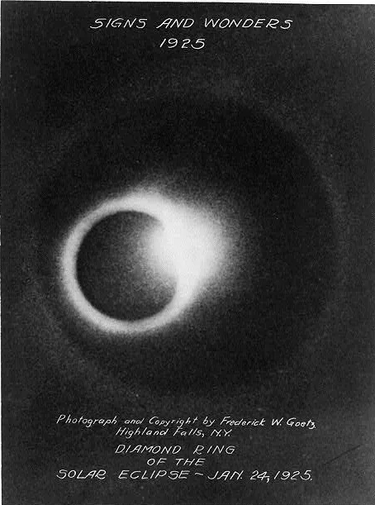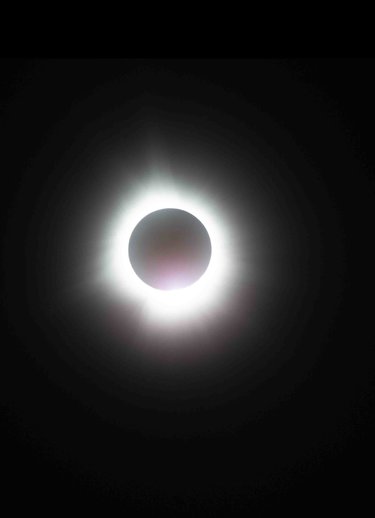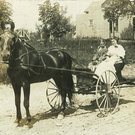From the editor: Something larger than our human differences
For a few moments today, we felt a sense of shared humanity, stunned by our universe.
We live in an era where we are constantly bombarded with information, a 24/7 news cycle — of wars, and floods, and droughts, and famines.
This is compounded and magnified with the misinformation that comes with social media.
But, in the weeks and days leading up to Monday’s solar eclipse, we found a rarity. News we could relish, facts that could be easily confirmed.
Websites popped up that would track, based on your ZIP code, when the moon would cross in front of the sun. Other websites informed us of cloud cover or clear skies.
We looked back nearly a century to the pages of The Enterprise to see our reporting the last time parts of New York state experienced a total solar eclipse.
On Jan. 16, 1925, The Enterprise reported that on Saturday, Jan. 24, an event that “will not occur again for a hundred years” would be “visible in a belt about a hundred miles wide, running across New York State diagonally, Buffalo, Binghamton, and Newburgh being about in the center.”
The story went on, “Astronomers tell us that it is so wonderful a sight that if one lives within reasonable travelling distance, it would pay one to go and see it. The sun will be hidden by the moon and will appear as a dark circle surrounded by what is called the corona, a sight which has caused astronomers on previous occasions to take a most expensive journey to observe it.”
For the everyday, stay-at-home observer, The Enterprise advised, “Before the eclipse one should try smoking glass and make sure that it is the proper density.”
We likened this to the current dispensing of eclipse glasses, which many of our local librarians wrote of on our pages.
On Friday, Kathy Stempel, who directs the Berne Library, told us she still had some glasses left.
So on Monday, just before the big event, I drove to her library to snag a pair for a friend.
My sister, Heather, had already sent me a pair. She hosted a viewing party in the field across from her house on Nebraska Valley Road in Stowe, Vermont.
Kathy Stempel greeted me warmly as she does all visitors to her library and handed me a pair of the colorful glasses. She said she had moon pies ready for whoever came to the library to view the eclipse from there.
After handing the glasses to my friend, I returned to my computer and, as usual, became immersed in my editing till an email from my husband, who works in Albany, popped up at 3 p.m.: “Eclipse!!” the subject line screamed. My husband rarely uses exclamation points and certainly not two of them.
“It’s well underway — maybe halfway — and very cool,” his message said.
I harnessed my hound, grabbed my eclipse glasses, and headed for Brandle Road, out from under the escarpment. When I looked up, through the clouds, I could see it — the edge of the moon against the sun.
A thrill coursed through my being.
I had read Annie Dillard’s account of the 2017 eclipse where she wrote, “Seeing a partial eclipse bears the same relation to seeing a total eclipse as kissing a man does to marrying him ….”
Maybe this was the blush of a first kiss?
While the clouds thickened so I could see no more, I felt the air cool and an eerie twilight descend.
I thought about my daughter in Philly who later sent a text of her clouds, my daughter in the Adirondacks in the path of totality, and both of my sisters — one in Maine and the other in Vermont — also plunged in darkness.
When the light returned, there was a sense of awakening. Had the birds been singing before, or did they just come to my notice now?
“Then the sky will lighten, the stars disappear, and everything becomes normal again,” said The Enterprise prediction from the last century.
But was everything normal again?
I remembered our Hilltown reporter — who was driving into Albany to watch the eclipse at the Empire State Plaza with his sweetheart where she works — anticipating the eclipse on Monday morning, likening it to the Super Bowl in the sense that everyone in our country is involved.
Except, he said, there aren’t opposing teams. We’re in it together.
The celestial show was the same as a century ago but what of the human condition? A four-paragraph story on the front page of the Jan. 30, 1925 Enterprise, headlined “The Eclipse of the Sun,” reported after the event:
“True to time as estimated by the scientists, our moon arrived in eclipse with the sun Saturday morning, and the stay-at-homes of Albany county a clear sky gave them a chance to see an over 90 per cent event.
“Many who could arrange their time and business to suit the schedule of the celestial spheres, took train for Saugerties on the Hudson to view the eclipse in totality.
“They report a most wonderful experience, and a view of the sun’s corona that will not be seen again in this part of the world for over a century. The papers, magazines and illustrated publications have been telling us all about this wonderful happening, but it was rather a weird sight to see what appeared like twilight creeping over the earth with a peculiar color to the atmosphere and, when at its fullest point, to observe the dark lines or waves passing over the fields of white snow, and to see Venus, Jupiter, and Mars keeping vigil not far away.
“We who in later years will not be able to travel to distant points to view a similar eclipse must be content with the memory of this one of 1925.”
I will no doubt be dead by 2044 when the next solar eclipse will occur in New York state.
As the papers and magazines and the radio stations of 1925 filled people with the desire to witness and understand the wonders of the universe, so, too, did the websites, and posts, and television programs of our day as well as the newspapers.
But the coverage that most struck me had less to do with the science than the commonality of the human experience.
Rebecca McCray in Hell Gate wrote of Jeremy Zielinski, an atheist who has loved science since he was a child. He is now incarcerated at Woodbourne and made a plea that was granted to be allowed to watch the eclipse from the prison yard.
Zielinski argued that the eclipse has special significance to atheists like himself, whose beliefs are grounded in a devotion to scientific discovery and achievement, McCray reported.
“To be able to put aside our differences and just enjoy something together is really, really important," said Zielinski. “There’s not that many opportunities to do it, especially in a place like this.”
He is right. We are, each of us, in some ways imprisoned in our own worlds.
It made us happy to think that children eating moon pies in Berne would be seeing the same spectacle that Zielinski was seeing from his prison yard.
There is something larger than our human differences.


